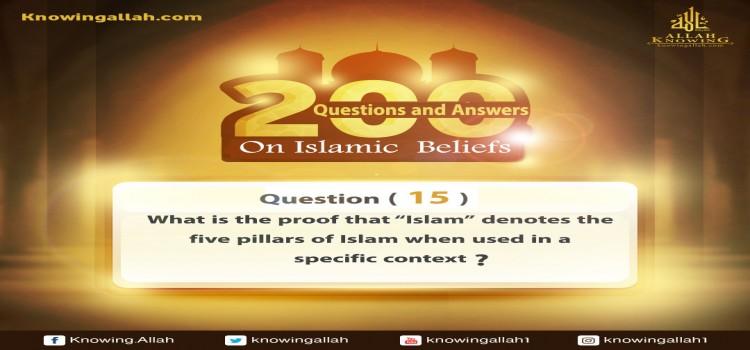THE FIVE PILLARS
THE FIVE PILLARS
In addition to the articles of faith (the theoretical aspect), Islam teaches us to put this faith into practice. A Muslim must practice five basic pillars of Islam as well as doing good deeds generally. Simply and briefly these are the five pillars of practice in Islam.
1. Shahadah (the testimony):
“I testify that there is no god but Allah, and I testify that Muhammad is the messenger of Allah.”
In Arabic, it sounds like this:
“ASH-HADU ALLA ILAHA ILLALLAH, WA ASH-HADU ANNA MUHAMMADAR RASULULLAH.”
”أشهد أن لا إله إلا الله وأشهد أن محمدا رسول الله“
This is the testimony that one must pronounce when embracing Islam. It reflects the beauty and simplicity of Islam.
2. Salat (prayer):
Performing the five daily, mandatory prayers (prayer includes standing, bowing, prostrating, reciting parts of the Qur’an, praising, and remembering Allah, and asking for His mercy, forgiveness and Paradise).
Talking about the beauty and power of prayers: they provide us with spiritual growth, psychological comfort, support, relief, tranquility, and contentment for our souls, minds, and hearts.
What adds to the beauty of prayer is the truth that God’s prophets, like Adam, Noah, Abraham, Moses, Jesus, and Muhammad were praying and prostrating to the one true God, Allah. So, Muslims are following the footsteps of those great prophets and messengers of God.
Furthermore, many other beautiful concepts, such as love of God, submission and surrender to Him, supplication, unity, equality, sincerity, patience, humility, and meekness are evidently manifested in and learned from prayer.
Indeed, sincere and humble ‘dhikr’ (remembrance of Allah) ‘du’a’ (supplication), ‘istighfar’ (seeking forgiveness), and ‘salat’ (prayer) - to Allah alone - are great and wonderful keys to peace of mind, tranquility, and blessings.
“Those who have believed and whose heartshave rest [tranquility] in the remembrance of Allah. Verily in the remembrance of Allah do hearts find rest [tranquility]!” (13:28)
“And your Lord (Allah) says, call upon Me; I will respond to you.” (40:60)
3. Zakat:
The mandatory giving of a certain amount of one’s wealth to the poor and needy. Zakat or alms giving purifies us from greed and miserliness. It purifies our properties and money and teaches caring and sharing which build strong bridges of mutual love and respect between the rich and the poor. Indeed, it fosters support, help, cooperation, and solidarity in society as a whole.
4. Sawm:
Sawm (fasting) is refraining from all intake of food and liquid, and from having sex with one’s spouse during a certain period of time (from dawn until sunset). Some of the beautiful benefits and lessons of fasting include:
• Spiritual benefits. It develops ‘taqwa’ (piety) and sincerity. The fasting month of Ramadan is a great oppurtunity for attaining God’s mercy and forgiveness, being saved from the Hell Fire, and obtaining eternal life in Paradise.
• Moral and emotional benefits. In the school of Ramadan (fasting), we learn and experience the hunger that millions of people in different parts of the world suffer from. It inspires us to share, to feel, to be humble, generous and kind.
• Educational benefits. Fasting teaches us many lessons. For example, we can learn that changing or quitting bad habits, like excessive eating is possible. Also, it disciplines our behavior and trains us to be patient and self-restrained. Furthermore, it reminds us that God’s prophets, like Muhammad, Moses, and Jesus used to fast, too.
• Health benefits. Through the process of fasting, the body gets rid of toxins and extra fats. Doctors and nutritionists recommend fasting and describe it as a ‘rubbish-burner’ and as a ‘curative therapy.’ Fasting is a good remedy for several diseases.
These are just some of the beauties and benefits of fasting the month of Ramadan.
5. Hajj:
Hajj is the pilgrimage to Makkah that every Muslim must perform once in his or her lifetime, provided he or she is physically, mentally, and financially able to do so.
Like the other pillars and tenets of Islam, the beauties, lessons, and benefits of Hajj are many. Millions of believers (of different colors and races and from different parts of the world) answer the call of Abraham. Wonderful principles and concepts can be seen in action during Hajj, including: submission and obedience to Allah, brotherhood and sisterhood in Islam, unity, patience, sacrifice, prayer, charity, and fasting. The Islamic pilgrimage (Hajj) witnesses and features the largest and most unique religious conference or gathering of its kind in human history.
At such a great convergence of all races and colors serving just one God and following just one message, Malcolm X and others have learned the lesson and the beauty of true faith, Islamic brotherhood, and equality - when they went to Makkah to perform Hajj.
“My pilgrimage broadened my scope. It blessed me with a new insight. In two weeks in the Holy Land, I saw what I never had seen in thirty-nine years here in America. I saw all races, all colors, -- blue-eyed blonds to black-skinned Africans -- in true brotherhood! In unity! Living as one! Worshipping as one!” - Malcolm X


